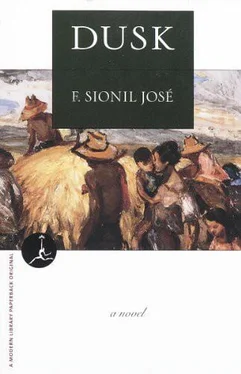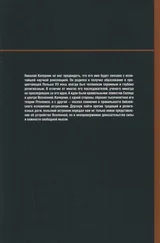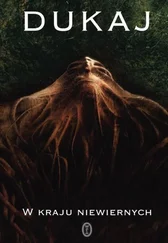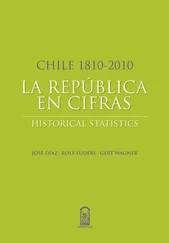Wearily, he rose and walked down the trail toward Tirad, where the butchers had gone. He saw her lying on her back in the sun, the girl who was taking a bath at the well, the piece of blue Ilokano cloth she had wrapped around her body already dry and in a heap beside her. She was so young, so very young — perhaps not even fourteen. Those small breasts were just starting to grow; below the waist, the pubic hair that was barely discernible was covered with blood. A little wound above the navel no longer bled. A line of blood had trickled right on the grassy trail and dried. He stifled a sob, remembering Dalin, what was done to her and how she had survived it. And Orang, too, how a Spaniard had defiled her. He picked up the cloth and covered her with it.
He must say a prayer. He knelt, and as he started to pray, he heard a thunder of hooves behind him. He turned, but not quickly enough, and the last thing he saw was a blue shirt.
Consciousness returned, his head throbbing as if it would split. He passed a hand over it, and at the back of his head was a huge lump now pulpy and soft. He withdrew his hand to look at what had stuck to it — clotted blood that had not yet dried. For a while, his vision dimmed and even in the blur, he saw again the girl prostrate on the grass. He stumbled, reached out to her and held her hand — it was still warm but limp. The face was calm, the eyes closed. Go to sleep, young one, and in this sleep, forgotten is the past, the anguish and the pain. Go to sleep, young one, and rest in peace.
Overhead, the sun was still high. When he tried to rise, it seemed as if the earth heaved and the sky was suddenly so close he could touch it. He let the dizziness pass without moving, afraid that if he stirred the sky would fall on him. It was no longer darkening; all around him the land was bathed with light — the edge of the dark forest, the slope of grass.
He rose slowly, feeling his bones, wondering if there was any other wound in his body that had numbed, but there was none. He was not yet up on his feet when he realized that the bundle slung over his shoulder was no longer there; it had been cut loose. A pang of anxiety gripped him. He looked around quickly. It was nowhere, not on the grass, not on the rise of ground before him. His hands went to the pocket of his loose trousers; the notebook was still there — it had not been taken — and so was the nub of a pencil.
What would he do now? Without the letter, who would believe this peasant? It was all there — the reason for his being here, his purpose, his measure as a man. But he knew what was in the letter. No, he must not stop. He must go on, convince them he was sent by the Cripple not just with a message but to help them through these mountains. He must tell them, too, of Baugen.
December was at hand and the air was already crisp, the valleys scented with harvest. He needed to rest — his lungs were caving in, his legs were like logs. Though his throat was parched, he did not approach any of the few isolated houses along the way to ask for a drink. Time was precious, and it must not be wasted on his simple needs.
At times he tried to run, his failing breath permitting it. How he wished Kimat were with him now. But in this tortuous region, anyone on horseback would be easily spotted by the Americans.
The Cripple was right; the Americans were no different from the Spaniards — they were here to humiliate, to deny life. The three insurrectos who were hanged in the plaza in Bauang — they had been dead for more than a day and still they were not cut down and buried decently. The people must see the fearsome handiwork and be coerced into betraying Aguinaldo.
The trail that clung to the hillside was darkening and in the night it was not the marauding wild boar or the snake that he was afraid of. It was the occasional brigand whose face he could not see and the treacherous crevices hidden by weeds and caved earth at the side of the trail.
The Buaya River was no longer swift and bloated the way it was during the rainy season. It whispered through boulders and pools, placid in the starlight, the trees and reeds alongside it like a black margin to the river’s course.
There was no habitation along the trail, even in those narrow valleys. Once or twice, he went down the river to drink, and put to flight a couple of deer as thirsty as he was.
Often, as he walked in patches clear of foliage, he would see the silhouette of Tirad — lofty and serene against the sky. Around him spread this quietude as if the earth breathed, muted sounds of crickets in the grass, night birds in the trees.
And again, thoughts of Cabugawan! He drew his strength from the earth and the earth meant peace. It was all changed now; he brought to mind the horrors that had been described so many times, they were vivid and real — how the Americans pumped water into the mouths of their prisoners, then stomped on their stomachs to pump out not just the water but information as well. Surely, they must have given him up for dead, as in Po-on. Otherwise, with the letter from the Cripple, they would have tortured him and he would then have brought harm not just to himself and to the president, but to the courageous Cripple he had left in Rosales.
He was in a narrow valley, small rice fields close by, the mooing of cattle, some farmer boy calling his water buffalo, a mother shouting to a wandering child to hurry with the firewood — the sounds of home that were all too familiar.
Then in the soft dark, a village suddenly stood before him. The thatch-roofed houses were indistinct. Some oil lamps were lighted, and cooking fires glimmered through the cracks of split-bamboo walls. He knew the village — the last before the ascent to Tirad. How many times had he been here with Padre Jose, and beyond, to the forbidding country of the Igorots. If he had to go deep into their land, he hoped that the men he knew — Kuriat, Ippig, and all the others — would still be in their villages and remember him. He had in the dim past brought them sugar, salt, and tobacco, and they in return had given him baskets, spearheads, and most important — protection.
He had not even reached the first house when from out of the darkness, the shout “¡Alto!” The command did not have to be repeated. He stopped and waited. From the shadows, two soldiers, their rifles pointed at him, approached, and a feeling of relief came over him, so pleasurable that he was smiling when the soldiers were upon him. He did not wait for them to speak. He addressed them in Spanish. “I have a message for the president,” he said.
One of the soldiers pointed a gun at him while the other frisked him carefully. He had nothing, of course, but the sack with the empty water bottle, the notebook, and the pencil.
“With your kindness,” he said with some exasperation. “There is so little time. I have an important message.”
The frisking over, but with their Mausers still pointed at him, they told him to walk in front to the far end of the narrow road. One of the soldiers went into a house beneath which were other soldiers getting ready to sleep. He could make out, beyond the fence, out in the fields, the figures of men standing sentry.
Another soldier came out with a candle and Istak recognized at once the boots, the rayadillo uniform, the sword. The Cripple had told him about this brave young man, how well he had fought. In the faint light, how boyish General del Pilar looked, how self-confident.
“Good evening, Señor General,” Istak said.
General del Pilar, impassive, raised the candle to have a better look.
“I had a letter for you, Señor General, from Don Apolinario. As you perhaps already know, he is in Rosales. You must believe me. It was taken away from me. Below, in Baugen. They — the Americans struck me on the head. Here,” he turned to show the clotted wound on his head. “I know these mountains, Señor. Don Apolinario said I could help. And that is why I followed you all the way from Rosales, to guide you to your destination.”
Читать дальше












